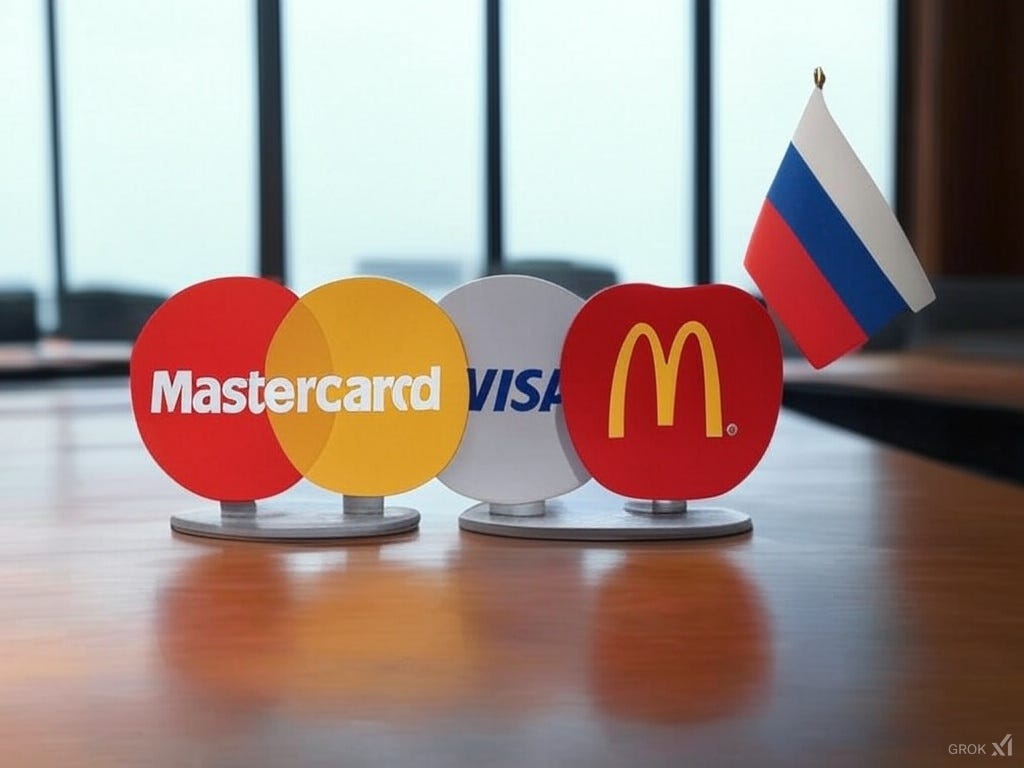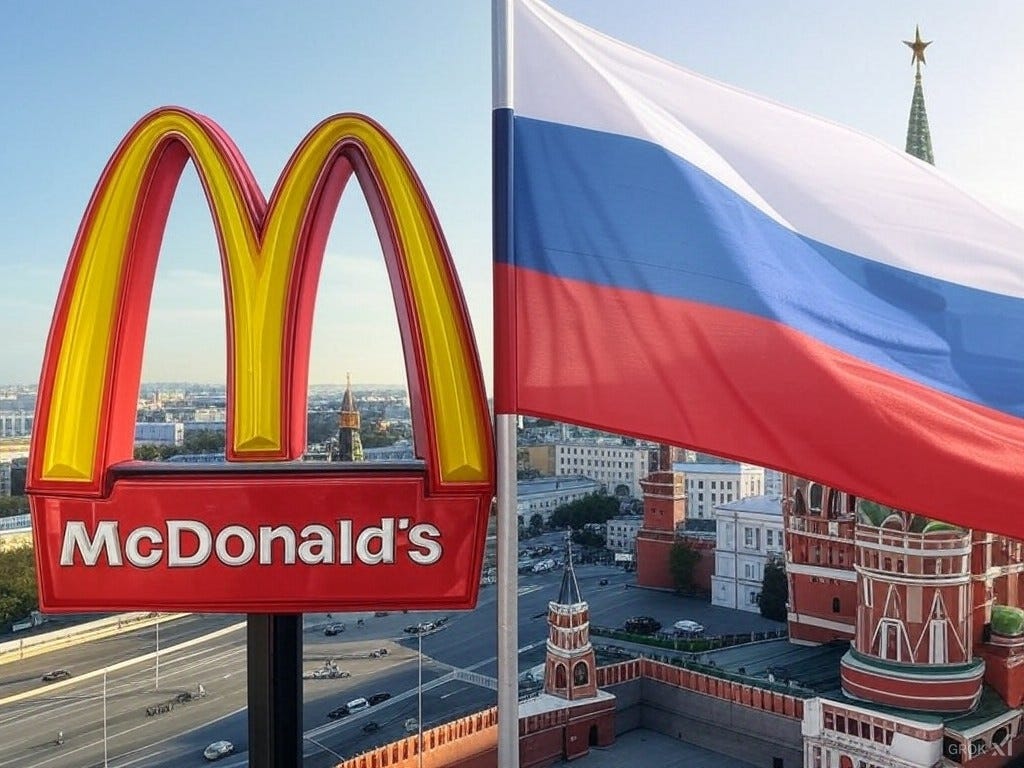The Geopolitical Implications of Western Brands Returning to Russia
Western Brands Eye Return to Russia: Geopolitical Shifts and Economic Realities Explored Amid Sanctions.
In recent years, geopolitics has become an increasingly intricate web of economic sanctions, diplomatic tensions, and shifting alliances. Nowhere is this more evident than in the evolving relationship between Russia and Western corporations. In a surprising turn of events, reports suggest that major players like Visa, Mastercard, and even McDonald’s could return to the Russian market by the end of 2025. This development raises critical questions about the interplay of economics, politics, and global business strategies.
A Shift in Dynamics: Why Are Companies Returning?
The decision by companies such as Visa and Mastercard to potentially re-enter Russia signals a recalibration of priorities amid a complex geopolitical landscape. According to Anatoly Aksakov, the head of the State Duma Committee on the financial market, these firms recognize the opportunities within the Russian economy despite lingering challenges. However, their comeback won’t be without hurdles. As Aksakov noted, the dominance of Russia's national payment card system (Mir) has reshaped consumer habits, making it harder for foreign entities to reclaim lost ground.
This potential return underscores how geopolitical risks are intertwined with corporate strategy. While sanctions imposed after 2022 initially forced many Western brands out of Russia, the allure of one of the world's largest consumer markets remains undeniable. Analysts from the Kokoc Group predict that up to 350 foreign companies may follow suit, driven by both profit motives and the need to maintain relevance in a rapidly changing global order.
Economic Sovereignty vs. Global Rivalries
The backdrop to this shift lies in broader trends shaping international relations. Geopolitical risk continues to dominate discussions about the future of the global economy, fueled by rising economic sovereignty and competition among nations. For Russia, fostering self-reliance through initiatives like the Mir payment system represents a strategic move toward reducing dependence on Western infrastructure. Yet, the prospect of welcoming back multinational corporations highlights the delicate balance countries must strike between asserting independence and engaging with the wider world.
Returning to Russia also reflects pragmatic considerations for Western firms. Sanctions have disrupted supply chains and created new competitors—local businesses that have stepped into the void left by departing multinationals. To regain market share, companies will need to navigate regulatory complexities while addressing public sentiment shaped by years of isolation from global brands.
Lessons from History: The Pivot Back to Engagement
This scenario echoes historical patterns where economic interests often override political disputes. During the Cold War, for instance, limited trade persisted between the U.S. and the Soviet Union despite ideological hostilities. Similarly, today’s developments suggest that commerce can serve as a bridge even in times of strained diplomatic ties. However, unlike past eras, modern geopolitics operates in a multipolar world where emerging powers play increasingly significant roles.
As the United States grapples with its role in this new global order, expanding economic cooperation with allies—and perhaps former adversaries—has emerged as a cornerstone of foreign policy. The potential return of Western companies to Russia aligns with this trend, illustrating how economic engagement can coexist alongside geopolitical rivalry.
Challenges Ahead: Managing Uncertainty
While the prospect of renewed business activity in Russia offers hope for some, it also poses risks. Elections, polarization, and conflicts continue to destabilize regions worldwide, creating ripple effects across economies. Any company considering a return to Russia must weigh these factors carefully, recognizing that geopolitical uncertainties can disrupt operations at any moment.
Western brands face the challenge of rebuilding trust among Russian consumers.
The decision by many Western corporations to exit Russia was largely driven by geopolitical events, particularly the conflict in Ukraine and subsequent Western sanctions imposed on Moscow. For decades, brands like McDonald’s symbolized globalization and the interconnectedness of economies. However, when geopolitical tensions escalated, these companies faced immense pressure from governments, shareholders, and public opinion to sever ties with Russia. In 2022, McDonald’s famously sold its Russian operations, renaming them under local ownership as "Vkusno i Tochka" (Tasty and That’s It).
Many Russians harbor resentment toward companies that exited the market in 2022, viewing their departure as compliance with what they perceive as a biased, anti-Russian narrative propagated by "Western warmongers".
This sentiment has fueled a sense of economic patriotism, with local alternatives gaining significant traction. For instance, the rise of the Mir payment system and homegrown fast-food chains demonstrates how Russian consumers have adapted to the absence of foreign brands. Re-entering this landscape will require not only strategic investments but also efforts to repair damaged reputations and reconnect with a skeptical audience.
Furthermore, domestic pressures cannot be ignored. Public opinion in home countries may oppose moves perceived as undermining sanctions or rewarding adversarial regimes. Balancing shareholder expectations with ethical concerns will require deft maneuvering.
Conclusion: Navigating the New Normal
The anticipated return of Visa, Mastercard, and other Western companies to Russia marks a significant moment in the ongoing saga of globalization versus fragmentation. It demonstrates how economic imperatives often transcend political divides, even in an era defined by heightened tensions. At the same time, it serves as a reminder of the resilience of local systems and the adaptability of consumers when faced with external shocks.
As we look ahead to 2025 and beyond, the lessons learned from this episode will likely shape future approaches to international commerce. Whether viewed through the lens of opportunity or caution, the resurgence of Western brands in Russia exemplifies the enduring complexity of geopolitics—a field where every action carries profound implications for security, freedom, and prosperity.
In navigating this uncertain terrain, businesses and policymakers alike must embrace flexibility, foresight, and collaboration. Only then can they hope to thrive in a world where the lines between competition and cooperation grow ever blurrier.






Why can these corporations simply enter Russia with impunity & resume business? Certainly, some border mechanisms must be in place to regulate & stop them if desired. Is the public desiring to have them back? USA business is often used as a cultural foothold to steer the populace toward western norms & viewpoints that undermine indigenous values. Russian young people are the bearers of this cultural divide. Is Russia really going to do this all over again to quell the bully? Also, I thought Russian banks recently "froze" many of these foreign assets that were still residing in Russia.
Who needs them now? They can stay outside Russia. Спасибо.